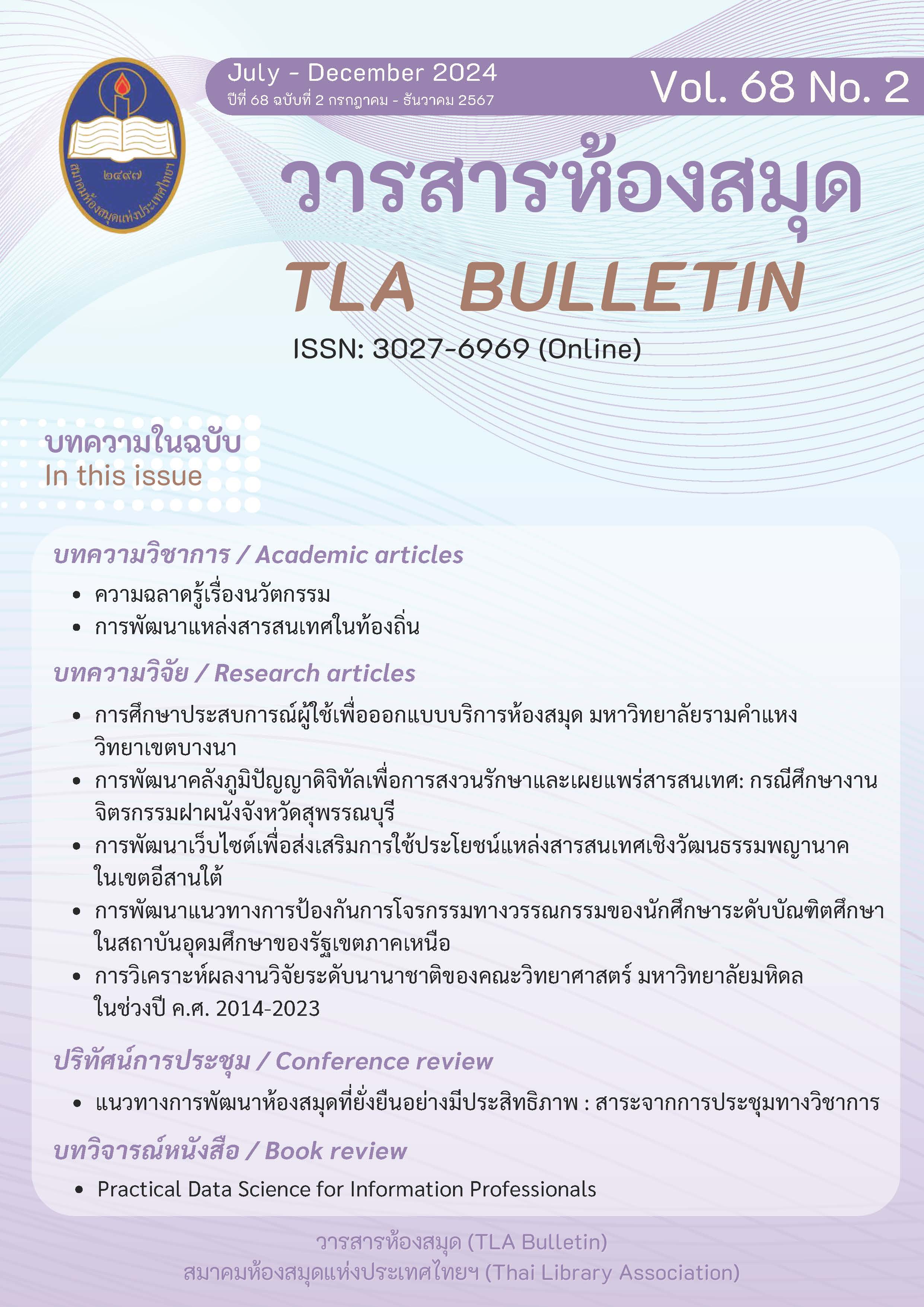แนวคิดเกี่ยวกับความฉลาดรู้เรื่องนวัตกรรม
คำสำคัญ:
นวัตกรรม, ความคิดเชิงนวัตกรรม, ความฉลาดรู้เรื่องนวัตกรรมบทคัดย่อ
ความฉลาดรู้เรื่องนวัตกรรมเป็นสมรรถนะที่จำเป็นประการหนึ่งของการพัฒนาผู้เรียนในศตวรรษที่ 21 ซึ่งการพัฒนาบุคคลให้มีความคิดเชิงนวัตกรรมนับเป็นสิ่งสำคัญที่ผู้บริหารจะต้องให้ความสำคัญและปรากฏในแผนการลงทุนขององค์กร เนื่องจากนวัตกรรมเป็นผลที่เกิดจากความคิดของบุคลากรที่สามารถเพิ่มขีดความสามารถในการแข่งขันขององค์กรและประเทศ ดังนั้น การพัฒนาบุคคลให้มีความสามารถทางนวัตกรรมขั้นสูงจึงจำเป็นต้องพัฒนาบุคคลให้มีความฉลาดรู้เรื่องนวัตกรรมซึ่งทุกองค์กรและทุกประเทศจะต้องให้ความสำคัญ
บทความนี้ผู้เขียนเรียบเรียงขึ้นจากการทบทวนวรรณกรรมที่เกี่ยวข้องทั้งในประเทศและต่างประเทศ โดยสืบค้นข้อมูลที่ตีพิมพ์ในปี 2000 เป็นต้นไปจากฐานข้อมูล Academic Search Ultimate, Emerald Management, ERIC, ScienceDirect, SpringerLink, Thai Journals Online ตลอดจนโปรแกรมค้นหา Google Web Search และ Google Scholar โดยนำเสนอแนวคิดเกี่ยวกับความฉลาดรู้เรื่องนวัตกรรมในประเด็นเกี่ยวกับความหมาย คุณลักษณะ ตัวแบบ เกณฑ์การวัด และปัจจัยที่ส่งผลต่อความฉลาดรู้เรื่องนวัตกรรม ซึ่งจะเป็นประโยชน์แก่บุคคลที่ต้องการพัฒนาความรู้ ทักษะ และเจตคติให้มีคุณลักษณะของผู้ที่มีความฉลาดรู้เรื่องนวัตกรรม นับเป็นทุนมนุษย์ที่สำคัญในการพัฒนานวัตกรรมขององค์กรและประเทศอย่างต่อเนื่องและยั่งยืน
Downloads
เอกสารอ้างอิง
Binkley, M., Erstad, O., Herman, J., Raizen, S., Ripley, M., Ricci, M. M., & Rumble, M. (2012). Defining twenty-first century skills. In P. Griffin, B. McGaw, & E. Care (Eds.), Assessment and teaching of 21st century skills (pp. 17-66). Springer.
Erdogan, N., Corlu, M. S., & Capraro, R. M. (2013). Defining innovation literacy: Do robotics programs help students develop innovation literacy skills? International Online Journal of Educational Sciences, 5(1), 1-9.
Gelb, M. J., & Caldicott, S. M. (2007). Innovate like Edison: The five-step system for breakthrough business success.Penguin.
Gong, L. (2023). Strategy research on improving college students’ innovative literacy under the concept of high-quality development. In Proceedings of the 2nd International Conference on Culture, Design and Social Development (CDSD 2022) (pp. 266-271). Atlantis Press.
Gregory, G. H., & Kuzmich, L. (Eds.). (2005). Differentiated literacy strategies for student growth and achievement in grades 7-12. Corwin Press.
Han, L., & Chen, C. (2023). Improvement path of students’ innovation literacy in higher vocational colleges. Advances in Vocational and Technical Education, 5(4), 67-73.
Krejci, P., & Sebestova, J. (2019). Innovative literacy levels: Gender, age and education matters. Marketing and Management of Innovations, (4), 353-363.
McGregor, J., Tweed, D., & Pech, R. (2004). Human capital in the new economy: Devil’s bargain? Journal of Intellectual Capital, 5(1), 153-164.
Office of the Royal Society. (2021). Educational vocabulary dictionary, Royal Society edition. (2nd ed.). [In Thai]
Partnership for 21st Century Learning. (2019). Framework for 21st century learning. Battelle for Kids. https://static.battelleforkids.org/documents/p21/p21_framework_brief.pdf
Royal Decree Establishing the National Innovation Agency (Public Organization) (2009). Thai Government Gazette, 126(63), 1-17. [In Thai]
Wang, S., & Zhou, L. (2023). Evaluation of information skills and innovative literacy cultivation of digital talent in universities. International Journal of Emerging Technologies in Learning, 18(20), 83-98.
Yamakami, T. (2012). Innovation literacy: Implications from a shift toward dynamic multidisciplinary engineering. In 2012 8th International Conference on Information Science and Digital Content Technology (ICIDT2012) (Vol.3, pp. 557-56). IEEE.
Yuksel, A., & Gunce, N. (2017). A model suggestion for increasing innovative literacy in vocational high schools. International Journal of Academic Value Studies, 3(17), 66-76.
Yuksel, A., Gok, M. S., & Gunsel, A. (2023). Measuring innovative literacy: Conceptualization, scale development and validation. Journal of Intellectual Capital, 24(5), 1079-1102.
Yuksel, A., Gok, M. S., Ozer, G., & Cigerim, E. (2022). A new theoretical approach to intellectual capital: Meta-synthesis definitions of innovative literacy. Journal of Intellectual Capital, 23(6), 1435-1460.
ดาวน์โหลด
เผยแพร่แล้ว
รูปแบบการอ้างอิง
ฉบับ
ประเภทบทความ
สัญญาอนุญาต
ลิขสิทธิ์ (c) 2024 วารสารห้องสมุด สมาคมห้องสมุดแห่งประเทศไทยฯ

อนุญาตภายใต้เงื่อนไข Creative Commons Attribution-NonCommercial-NoDerivatives 4.0 International License.




